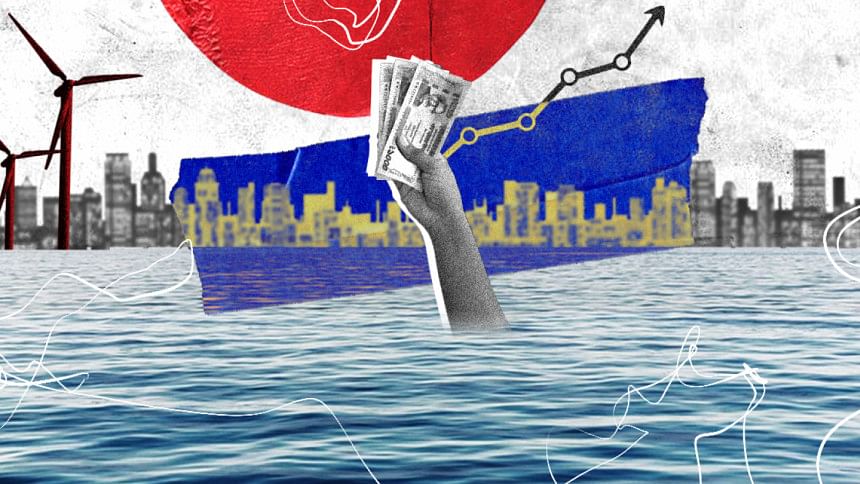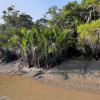Strengthening our blue economy

We often assume that a blue economy is all about exploring oil and gas from the ocean floor and monetising it. But there's much to it than that.
In October 2019, an article titled "Blue Economy – Development of Sea Resources for Bangladesh" was posted on the Ministry of Foreign Affairs website. The write-up put 25 sectors under the blue economy banner, with a couple of the less talked-about sectors including the conservation and sustainable management of marine and coastal ecosystems (such as mangroves), and the livelihoods of the people depending on those resources. Examples of the latter—also known as blue livelihoods—are small-scale coastal and deep-sea fishing, crab collection from the Sundarbans' floor, post-larvae collection of shrimp from the Kholpetua River in Satkhira, and the harvesting of honey and gol pata (nipa palm leaves) from the mangroves. The 65-day annual fishing ban on the Bay of Bengal imposed by the government since 2019—to increase fish production and deter illegal, unreported, unregulated (IUU) fishing by commercial fishing boats from Bangladesh and neighbouring countries—is also critical to sustaining our blue economy.
Protection of marine and coastal ecosystems is also crucial given its importance for human well-being, economic growth, environmental sustainability, and biodiversity conservation. Bangladesh, for example, has three Marine Protected Areas (the Swatch-of-No-Ground, Nijhum Dwip, and Saint Martin's Island) that boast rich populations of whales, dolphins, sharks, rays, corals, seaweed, and other plants and animals. The country also owns 60 percent of the 10,000-square-kilometre Sundarbans, half of which is now protected as wildlife sanctuaries. From a climate change mitigation standpoint, such protection is vital for removing carbon from the atmosphere by mangroves, seagrass (marine flowering plants), seaweed (large marine algae), and microscopic phytoplankton algae. This is branded as "blue carbon" and these ecosystems are called "blue carbon ecosystems."
But in order to take ocean-related activities forward, we need money (or Blue Finance). While presenting Bangladesh's Tk 761,785 crore national budget for 2023-2024, the finance minister linked the blue economy directly with the fisheries sector. There is however no data on how much money the country is investing to advance the sea-based economy. Blue Bond—wherein a financial institution sells bonds to raise money for ocean-based activities—is mentioned in the Mujib Climate Prosperity Plan 2022-2041 (MCPP2041). In September 2022, Bangladesh Bank issued a Green Bond policy to guide the establishment of green bond mechanisms to realise environment-friendly, renewable energy-driven economic activities. But till now, we haven't seen any concrete attempts to launch blue bonds or ocean-focused financial tools.
While thinking of a sea-based economy, we must think of "Blue Justice" and "Blue Equity" to ensure people's rights over coasts, seas, and the resources therein. We need to see if, in the name of exploring and protecting our marine resources, we are negatively affecting local communities. The annual 65-day fishing ban (May-July) is apparently a good thing for conserving fisheries in the Bay of Bengal. But are fishers being sufficiently compensated? Do they even have the identity cards that officially pronounce them as fishers?
To achieve blue justice, we need to invest in "Blue Governance." We need to know who the stakeholders are: marine resource-dependent local people; concerned government agencies, including law enforcement bodies; private sector entities; civil society; local government representatives; academics; and development partners. We need to ensure their representation in the governance structure and meaningful participation in decision-making, and that the implementation process is accountable and transparent.
The Blue Economy Cell of Bangladesh was established as the focal agency for the blue economy in January 2017, thus facilitating blue governance. Almost seven years on, the Cell has been struggling to meet expectations. The government could intervene in three areas to speed up the Cell's pace.
First, from the Energy and Mineral Resources Division of the Ministry of Power, Energy, and Mineral Resources, the Cell should be transferred to the Planning Commission of the Ministry of Planning, because the role of the Cell is essentially strategic planning based on evidence, involving a large number of public and private entities. Bangladesh's Planning Commission, especially its General Economics Division (GED), has some commendable achievements under its belt, such as Delta Plan 2100 and the Perspective Plan of Bangladesh 2021-2041. Relocating the Cell to the country's apex planning body would accelerate its role.
Second, over the last few years, Bangladesh has been publicly disclosing its annual climate-relevant budget, gender budget, and poverty-reduction expenditure as part of its financial accountability in these priority areas. The Blue Economy Cell could develop a guided template to collect budgetary and expenditure information from concerned ministries and agencies, and prepare the Blue Budget for FY 2024-2025. Such an exercise will increase the self-awareness of government stakeholders in the blue economy; improve the profile, leadership, and value of the Cell in terms of blue governance; and subsequently create a momentum for an ocean-based economy (which is long overdue).
Finally, the Maritime Affairs Unit of the foreign ministry recently published the Blue Economy Development Work Plan based on consultations with a wide range of stakeholders. Out of 56 action points, the Work Plan identifies the Cell's role only in oil and gas exploration, pollution management, and marine spatial planning. Instead of preparing a new strategy and plan, the Cell should urgently take initiatives to operationalise the Work Plan. While doing so, the Cell should take blue justice as one of the core guiding principles of the implementation instrument by ensuring inclusive and equitable actions. This can be done by enhancing the livelihoods of communities living along Bangladesh's coast, ensuring environmental sustainability while harvesting mineral resources from the Bay, and by implementing sustainable natural resource management.
Dr Haseeb Md Irfanullah is an independent consultant working on environment, climate change, and research systems; and is a visiting research fellow at the University of Liberal Arts Bangladesh (ULAB). Email him at [email protected]
Views expressed in this article are the author's own.
Follow The Daily Star Opinion on Facebook for the latest opinions, commentaries and analyses by experts and professionals. To contribute your article or letter to The Daily Star Opinion, see our guidelines for submission.

 For all latest news, follow The Daily Star's Google News channel.
For all latest news, follow The Daily Star's Google News channel. 











Comments